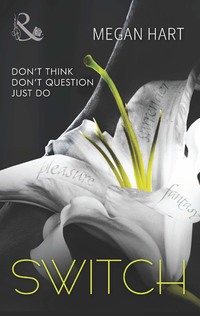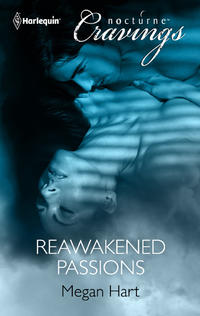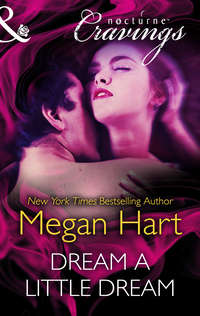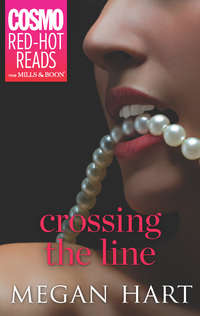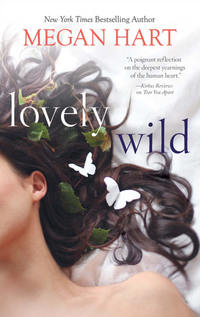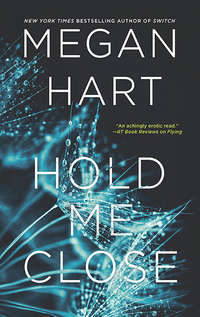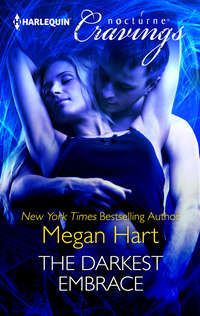
Полная версия
Tempted
She shrugged and grabbed up the lids to the open containers of deli salad on the counter. “You know the boy your mother warned you about? That’s Alex.”
“Was,” I said, helping her close up the plastic tubs of macaroni salad and coleslaw. “In high school.”
She looked out the window toward the deck, where James and Alex were laughing quite loudly.
“I don’t know,” Molly said. “What do you think?”
“He’s James’s friend, not mine, and he’s only staying for a few weeks. If James likes him—”
Her sharp burst of laughter stopped me. “Alex Kennedy led my brother down a lot of bad roads, Anne. Do you really think someone like that can change?”
“Oh, c’mon, Molly. We’re grownups, now. So what if they got into trouble a few times as kids? They didn’t kill anyone. Did they?”
“Well … no. I don’t think so.” She sounded like she wouldn’t have been surprised if Alex, at least, had committed murder.
I knew she’d never think such a thing of James, the beloved baby of the family. Just like I knew that no matter how much James had been a part of whatever hijinks he and Alex had got into as kids, it would always be Alex’s fault and never James’s. The Kinneys hadn’t done their son and brother any favors by setting him on such a high perch, in my opinion. James had a lot of self-confidence, which was good. He wasn’t so great about taking blame, which wasn’t.
“So tell me what they did that was so bad, then.”
Molly rinsed and wrung one of the dishcloths and proceeded to wipe down the center island, though I’d already done it. This annoyed me much less from her than it would have from her mother, who’d have been doing it deliberately. Molly simply had been conditioned to following after someone else’s efforts and straightening the edges—even if they weren’t untidy.
“Alex doesn’t come from a very good family.”
I didn’t comment. If you want to know how someone really feels, you almost never have to ask. Molly swiped at invisible spots with her cloth.
“They’re white trash, to be perfectly honest. His sisters were sluts. One or two of them got pregnant in high school. His mom and dad are drunks. They’re all low-class.”
I don’t think I flinched at her judgment of Alex’s family. She wasn’t talking about my sisters, or my parents. Or about me.
I wanted to tell her that she was lucky nobody judged her based upon how her parents acted, but I kept that opinion to myself, too. “There must have been something good about him for James to be his friend, Molly. And we aren’t always what our parents are.”
She shrugged. There was more she wanted to tell. I saw it in her eyes. “He smoked and drank, and more than cigarettes, if you know what I mean.”
“Lots of kids do that, Molly, even the so-called good ones.”
“He wore eyeliner.”
My eyebrows rose, both at once. There it was. The worst of it. Worse, somehow, than the drinking or the weed smoking, or even the fact his family was white trash. This was the real reason they hadn’t liked Alex Kennedy, and didn’t like him now.
“… eyeliner.” I couldn’t help saying it like it was ridiculous, because … well … it was.
“Yes,” she hissed, glancing again to the deck. “Black eyeliner. And … sometimes …”
I waited while she struggled with whether or not she could possibly bring herself to continue.
“Lip gloss,” she said. “And he dyed his hair black and wore it spiked out all over, and he wore high-collared shirts with pins at the throat and suit jackets ….”
I could picture him, a Robert Smith wannabe, or like Ducky from Pretty in Pink. “Oh, Molly. So did lots of people. It was the 80s.”
She shrugged again. Nothing I could say would change her mind. “James didn’t. Not until he started hanging out with Alex.”
I’d seen pictures of James from that time. He’d been scrawny and gangly, a hodgepodge of stripes and plaids and battered Converse sneakers. I hadn’t noticed any liner or gloss but could easily imagine him wearing it. It would have set off his vivid blue eyes quite nicely, I thought.
“Anyway,” Molly said. “He doesn’t seem to have changed much.”
“I’ll keep an eye on my makeup bag.”
This time, she didn’t miss the veiled sarcasm. “I’m just telling you, Anne, Alex was bad news then, and he’s probably no better now. That’s all. Do with it what you want.”
“Thanks.” I didn’t want to do anything with it. The more they all hated Alex, the better I felt I wanted to like him. “I’ll keep that in mind.”
“We were all really glad when James didn’t hang out with him anymore,” she added, unprompted, and I looked up at her again.
“I know they had a fight.”
If you want someone to tell you something they really want to say, all you have to do is let them.
But however much Molly might want to say about it, she couldn’t. “Yes. I know. James never said what it was about. Just that Alex had come to visit him in college—Alex didn’t go to college, you know.”
It hadn’t seemed to hurt him at all. I didn’t comment on that, either.
“Anyway, he went to Ohio State to visit James and something happened, and they had a big fight. James came home for a week. A week! And then he went back to school and we never found out what had happened.”
I couldn’t stop the smug smile wanting to creep over my mouth, so I hid it by loading some containers into the refrigerator. That was even worse than the eyeliner. That James had dared not to share every intimate detail of his life with them. That he had something they didn’t know.
A secret.
Of course, he had it from me, too.
Chapter 04
I went to bed before the men did, and James woke me when he slid in beside me. He gave me a nudge or two, but I feigned sleep and soon his snoring buzzed over me. I’d been sleeping more peacefully before he came to bed, but now I lay awake listening to the noises all houses make in the night. The same creaks and groans, the ticking of an extra-loud clock. But tonight, something unfamiliar. The shuffle of feet in the hall, the flush of a toilet and thud of a door closing. Then the sound of sleeping again, the air heavy with it, and I let James pull me closer, until I fell back to sleep in his arms.
He was up and gone in the morning before I woke. I lay in bed for a while, stretching and thinking, until the need for the bathroom forced me up and about. Alex was out on the deck already, a mug of coffee in one hand. His eyes swept the lake and back as a morning breeze ruffled the fringes of hair falling too long over his forehead. I painted an image of mid-80s high fashion on him with my mind, and it made me smile.
“Good morning. I thought you might still be asleep.” I joined him as I sipped my own coffee. It was good. Better than I made it.
I was getting used to his languid looks. I was getting used to him. His mouth tilted.
“I’m all messed up from traveling. Time zones, jet lag. Besides, early bird and all that.”
He gave me a grin so easy I had no choice but to return it. Side by side we leaned on the railing and looked out over the water. I didn’t feel like he expected me to say anything, and he didn’t, either. It was nice.
When he’d finished his coffee, he lifted the empty mug. “So. It’s just you and me today.”
I nodded. I wasn’t as worried about it as I’d have been the day before. Funny how being warned away from him made me feel that much more comfortable. “Yep.”
He looked back out over the water. “Do you guys still have the Skeeter?”
The Skeeter was the little sailboat belonging to James’s grandparents. “Sure.”
“Want to take her out? We could sail across to the marina, hit the park, grab some lunch at Bay Harbor—be tourists for a day. My treat. What do you say? I haven’t been on a roller coaster in about a hundred years.”
“I don’t know how to sail.”
“Anne.” The look dipped down, one brow raised, his smile half a leer. “I do.”
“I don’t really like sailing ….” His look, that seductive, pleading, half-pouting look, stopped me.
“You don’t like sailing?” He looked over the water again. “You live on a lake, and you don’t like sailing.”
It did sound dumb. “No.”
“You get seasick?”
“No.”
“You can’t swim?”
“I can swim.”
We studied each other. I think he was waiting for me to tell him what I really wanted to say, but there wasn’t anything I wanted to share. After a minute, he smiled again.
“I’ll take care of you. Don’t worry.”
“You’re an expert sailor?”
He laughed. “They don’t call me Captain Alex for nothing.”
That made me laugh. “Who calls you Captain Alex?”
“The mermaids,” he said.
I snorted. “Uh-huh.”
“Anne,” Alex said seriously. “We’ll be fine.”
I hesitated again and looked at the water, then the sky. It was a beautiful day, the only clouds white and fluffy sky-sheep. Storms could flare up fast, but it was only a twenty-minute sail across the lake to the Cedar Point Marina.
“Sure, okay.”
“Perfect,” Alex said.
We docked at the marina. Alex had, indeed, proven himself a capable sailor. I hadn’t been to the Point since last year. As always with each season, fresh paint and rides made even the familiar new again.
We were lucky. The crowds were thin that day, mostly busloads of kids on school trips who arrived early, but hung in herds leaving vast areas uncrowded.
“I had some good times here,” Alex said as we picked a direction and meandered down one of the tree-covered paths toward the back of the park. “This was my first real job. First real money. This was the first place I realized I could actually get out of Sandusky for good.”
“Was it?” We stepped aside to let a fast-moving swarm of kids pass us. “Why?”
“Because I knew there were other places to work than here or the automotive parts factory,” he said. “The Point hires a lot of college kids. Hearing them talk about where they were going and what they were going to do made college seem like something I could really do.”
I already knew he hadn’t gone.
He looked at me. “I didn’t go, though.”
“And now you’re back here.” I wasn’t trying to be a smart-ass, just pointing out something interesting. A circle.
He laughed. “Yeah. But I still know there’s more to the world than this place. Sometimes it’s good to remember there’s home, though, too.”
“You still think of here as home?” We were heading toward what once had been the tallest, fastest and steepest roller coaster in the park, The Magnum XL-200. It was still an impressive structure. I liked to ride in the front.
“Someplace has to be, right?”
The queue wasn’t as long as it sometimes got in the height of summer, when wait times could be hours long. Still, we did have to wait, and the line moved along slowly enough to give us ample time for conversation.
“I got the feeling you weren’t a big fan, that’s all.” Without discussing it, we both moved toward the row of cattle chutes that would lead us to the front seat of the coaster.
“I have some good memories.” He shrugged. “Who said home’s the place where you go and they have to take you in?”
“Robert Frost?”
He laughed. “I guess that’s why Sandusky is still home. I came back and someone took me in.”
Someone had, but not his family.
The attendant waved us into the front car, where we sat knee against knee and buckled ourselves in tight. The Magnum might not be the fastest or the tallest anymore, and it might not have any loops, but it’s an impressive coaster just the same. Two hundred and five feet high with a one hundred-and-ninety-five-foot drop, it’s the most thrilling two minutes you’ll ever spend.
The ride to the top of the first hill takes forever, but once there, the view of the park is amazing. The breeze ruffled Alex’s hair, and the sun was bright enough to make me squint; I’d taken off my sunglasses in preparation for the plunge. We looked at each other, and when I saw the grin on his face I felt one on my own.
“Hands up,” he said.
We raised our hands.
Poised at the top of a roller coaster, I always have time to think, “why am I doing this?” I love them, the twists and drops, the stomach-sinking feeling and adrenaline rush. But at the top, with the world spread out below me, I always pause to wonder why I’m subjecting myself to the fear.
We seemed to hang over the edge for a long time before finally beginning the downward swoop. I was already bracing myself, already opening my mouth to scream.
Alex grabbed my hand.
We fell.
We flew.
I screamed, but with laughter and without breath. It was like being shot into space, twisting, turning and dropping. Soaring. And in two minutes it was all over, and the train pulled into the station with its passengers shaking and windblown. My teeth felt dry. Alex let go of my hand.
On vaguely trembling legs I got out of the car and followed him down the steps to the exit. He held open the small gate for me at the end and turned to walk backward, facing me, his face alight.
“The Magnum is the perfect fucking coaster,” he said. “They can make ‘em taller, but they don’t make ‘em sweeter.”
“James doesn’t like roller coasters.” It was true, but it suddenly sounded disloyal, and I wasn’t quite sure why. “He says he overdosed on them as a kid.”
“Nah. He never liked them.” Alex shook his head and made a circle in the air with a finger. “He’ll ride the Puke-a-Tron or the Barf-o-Rama twenty times in a row, but he won’t ride a coaster.”
“He’s got equilibrium.” James could go on those spinning rides without getting sick. “He’s good at turning in place.”
“But not so good at going up and down.” Alex’s hands swooped, following the curve of a coaster. “How about you, Anne?”
“I like both, I guess.” We were following another winding path, past food stands and games whose vendors implored us to take a chance on winning a stuffed toy. The scents of popcorn and fries tickled my nose, and my stomach rumbled.
He slanted me a look. “But you like coasters better.”
I gave him an equally sideways glance. “Sometimes.”
He laughed. “Me, too.”
Ahead of us was the sign for Paddlewheel Excursions, a ride the park designated Tranquil and which was in essence a staged boat ride through quirky, animated scenes and narrated by the boat’s “captains.” The last time I’d ridden it, the operators wore uniforms designed to look like old riverboat captains, complete with maroon vests and ruffled armbands. Now they wore regular park uniforms. I was disappointed.
“Wow. Paddlewheel Excursions. I haven’t been on this ride in forever.” I paused at the entrance.
“So, c’mon. Let’s go.”
“We don’t have to. There are plenty of other rides to go on.”
“So?” Alex held out a hand. “We have time.”
The ride was as hokey and charming as I remembered. The jokes were silly but made us laugh, anyway, and the ride itself was serene. We sat in the back, thigh to thigh on the narrow bench. The water in the canal was a murky green.
“I always thought they ran on a track,” I murmured as the captain of our boat revved the engine to avoid a sandbar.
“When I worked here, one of the guys almost sank one.”
“Did he?” I turned to look at Alex. “How could you do that?”
“Hit the dock hard enough, I guess you can put a hole in anything.” Alex nodded toward the dock where two other captains awaited to tie the boat in place so we could disembark.
I looked at Alex closely. “Was it you?”
For a moment he looked stunned, then started to laugh. “No. I cleaned toilets.”
My surprise must have shown on my face. “I always thought—”
America’s not a place comfortable with a class system. We’re all equal, even when we aren’t. Nobody would ever have admitted aloud that the restroom attendants tended to be not as … socially presentable … as the people they hired to operate the rides and serve the food.
“See what a bad attitude will get you?” He shrugged.
We got off the boat. I thanked the young captain, who still looked embarrassed about his close call with the sandbar. I heard his friends ribbing him as we left.
“So. You cleaned toilets. For how long?”
“Two seasons. Then I moved into full-time maintenance.”
“You worked here a long time,” I said.
“Until I was twenty-one. I met a guy at a club who was hiring people in his factory overseas. He put me into transportation and distribution. Two years later I had my own business.”
“And now,” I teased, “you’re a bazillionaire.”
“From cleaning crappers to self-made man,” Alex said, not boasting but not downplaying his success, either. “From shit to shine.”
I needed a drink and stopped to buy two large fresh-squeezed lemonades. The drink was tart and cold and puckered my mouth. It was delicious. It was liquid summer.
James had told me the big fight with Alex was during his senior year of college, when they were both twenty-one. I’d always assumed alcohol was somehow involved. Booze has made and broken many relationships.
“And you’ve never been back until now?” I asked.
Alex shook the ice in his cup before sipping. “No.”
He’d left the country when he was twenty-one upon the invitation of a guy he met at a club and after a fight with his best friend so catastrophic neither of them would discuss the cause. Or maybe I was extrapolating and the fight had been of such minor consequence, the rest of it coincidence, that neither felt the need to comment.
I poised on the edge of asking for details but then backed off. Asking him to elaborate would mean I’d have to admit I didn’t know, and what sort of wife wouldn’t know something like that about her husband? I didn’t know Alex Kennedy well enough not to care what he thought about my marriage.
“Well, we’re glad to have you now.” It was the right sort of thing to say, I thought, but he only gave me another of his slow glances and a smirk.
“I said I’d treat you to lunch at a fancy place,” he said. “But I’m starving for a good burger and some nachos.”
That sounded better to me than something hoity-toity, anyway. Even in the casual resort atmosphere, I felt under-dressed for a place nicer than a burger stand. We grabbed food and found a table, where we ate and talked.
He was better at listening than he was at sharing, with a knack for drawing answers out of me I’d have withheld from someone else. He was both subtle and forthright, asking questions that might have sounded rude from someone who wasn’t at the same time so disarming. It’s easy to be interesting for someone who’s interested, and I found myself waxing poetic on subjects I hadn’t touched in a long time.
“I just wanted to help people,” I said, when he asked me why I hadn’t gone back to work after the funding for the shelter failed. “I don’t want to work at Kroger, bagging groceries. Or in a factory, putting lids on jars. And besides, if we have kids …”
He was leaning back in his chair, but his body weight shifted when I said that. “Do you want kids?”
“James and I have been talking about it.”
“That’s not what I asked you.”
The breeze had picked up and gotten colder. I looked at the sky. It had grown darker while we talked. The rumble of the roller coasters masked faraway thunder.
“It’s going to storm.”
“Yeah. It might.” He looked back at me. I must’ve looked disturbed. “You want to go.”
He didn’t ask. He just knew. I thought about shrugging it off, protesting I was fine, but I didn’t.
“Yes,” I said. “I don’t like being on the water in a storm.”
We made our way back to the marina. The water had turned choppy and gray. The sky wasn’t black, not yet, but the clouds were no longer fluffy white sheep.
Alex moved fast without rushing. Steady. He unrigged, we pushed off and he pointed us toward home. I gripped the Skeeter’s sides. I didn’t have a life vest on. I wouldn’t let go long enough to grab one.
The wind fought us, and though we made progress toward home, it was slow and rough. Spray whipped our faces every so often. I tipped my face to the sky, no longer needing my sunglasses to protect my eyes from the glare. Was the rain coming? The lightning and thunder?
I saw the blue-white flash of it from far away and heard the hint of a rumble. My stomach lurched. We were halfway between the Point and home.
I could swim. If the boat sank, I could swim. I knew I could. But people drowned all the time in sudden squalls because they weren’t prepared, because they’d taken chances, because they’d been stupid. Even people who could swim. Even those who’d won medals for it. And still, I couldn’t make my fingers let go of the boat’s sides long enough to grab up the faded orange life vest.
Alex muttered a curse when the wind came up and tried to steal the sail. He yelled for me to grab a rope, pull a knot, something I didn’t understand. I didn’t know how to sail. I’d never learned.
The boat rocked and jumped on sudden waves. One took us higher than expected, and when we dropped into the valley it left behind my stomach heaved into my throat. Up. Down. A roller coaster without exhilaration. Without the safety of brakes and seatbelts.
The rain coming across the water looked like lace curtains or the scrolling of the numbers and symbols on the black screen in the opening frames of The Matrix. It looked like the tornado from The Wizard of Oz, its curving dinosaur neck bringing doom.
The Skeeter was small, and it rocked when Alex shifted his weight to bend next to me. I drew in a breath, not screaming but heart pounding so fast and hard it hurt. My fingers gripped tighter, my knuckles white.
“Don’t worry!” He had to shout over the sound of the wind. “We’re almost home!”
The storm reared up in full force when we were just a few feet from the shore. Alex jumped out to tie the Skeeter up onto the small wooden dock James’s grandparents had built. The sail snapped and fluttered. I caught a face full of wet fabric and gasped at how cold it was.
Once we were safely on shore, my fingers unkinked. I helped him tie everything down and secure the Skeeter. The waves were storm-sized but still did no more than tickle the beach; this wasn’t the ocean, after all.
The rain came down in fat, stinging splatters. Drops struck the top of my head, my arms, got in my eyes and ears. We ran into the house and skidded on the tile floor. Alex slammed the door and the sound of the storm outside muted at once. I heard heavy breathing and realized it was me.
“You’re shivering.” He grabbed up a dishtowel from the counter and handed it to me.
I held it for a moment, the fabric inadequate to do more than wipe my face. I did that.
“My father,” I said, and stopped. My teeth chattered like dice in a cup.
Alex dripped, waiting for me to speak. Lightning from outside reflected in the puddle at his feet. I tried again.
“My father,” I said, “took me out on a boat. We were supposed to be fishing. It started to get dark.”
He ran a hand through his wet hair, smoothing it back from his forehead. Water ran down his face, off his nose and chin. His eyes caught the green light from the microwave.
“The storm came up fast. We weren’t too far out. But I didn’t know how to sail. And … he was …”
He was drinking, as he almost always was when he wasn’t at work. He’d filled his cup again and again from the jug of “iced tea” in the red-and-white cooler between his feet. The sun made him thirsty, he said. I was ten and had tasted what was in his cup. I didn’t see how it could quench his thirst.
Alex’s shoes squeaked on the tile as he came closer. His hand on my shoulder felt heavier than it should have, an undeserved weight. He meant it to be caring, but his understanding was too intimate to be borne. I didn’t want to be beholden to him for his compassion.
I shook off the memory. “We didn’t drown, obviously.”


